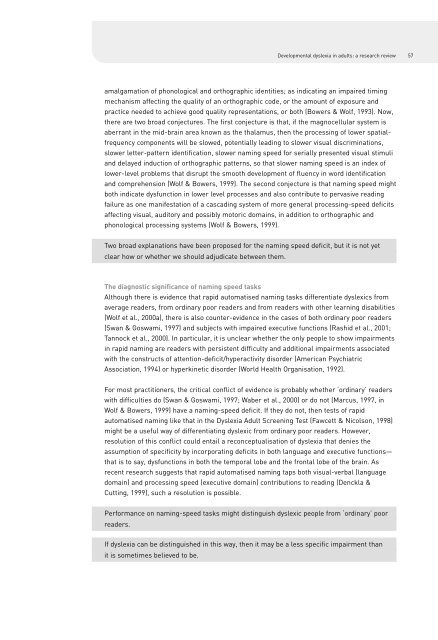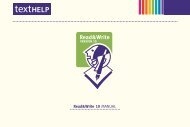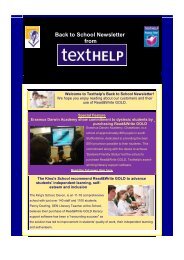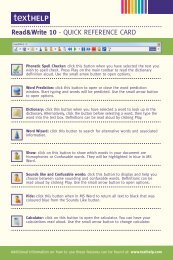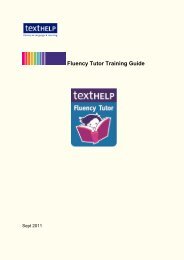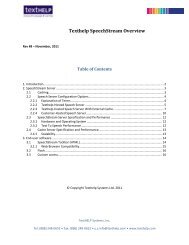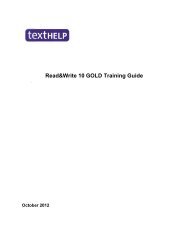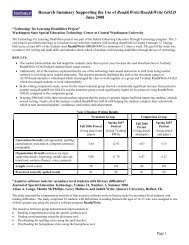01 NRDC Dyslexia 1-88 update - Texthelp
01 NRDC Dyslexia 1-88 update - Texthelp
01 NRDC Dyslexia 1-88 update - Texthelp
You also want an ePaper? Increase the reach of your titles
YUMPU automatically turns print PDFs into web optimized ePapers that Google loves.
Developmental dyslexia in adults: a research review 57<br />
amalgamation of phonological and orthographic identities; as indicating an impaired timing<br />
mechanism affecting the quality of an orthographic code, or the amount of exposure and<br />
practice needed to achieve good quality representations, or both (Bowers & Wolf, 1993). Now,<br />
there are two broad conjectures. The first conjecture is that, if the magnocellular system is<br />
aberrant in the mid-brain area known as the thalamus, then the processing of lower spatialfrequency<br />
components will be slowed, potentially leading to slower visual discriminations,<br />
slower letter-pattern identification, slower naming speed for serially presented visual stimuli<br />
and delayed induction of orthographic patterns, so that slower naming speed is an index of<br />
lower-level problems that disrupt the smooth development of fluency in word identification<br />
and comprehension (Wolf & Bowers, 1999). The second conjecture is that naming speed might<br />
both indicate dysfunction in lower level processes and also contribute to pervasive reading<br />
failure as one manifestation of a cascading system of more general processing-speed deficits<br />
affecting visual, auditory and possibly motoric domains, in addition to orthographic and<br />
phonological processing systems (Wolf & Bowers, 1999).<br />
Two broad explanations have been proposed for the naming speed deficit, but it is not yet<br />
clear how or whether we should adjudicate between them.<br />
The diagnostic significance of naming speed tasks<br />
Although there is evidence that rapid automatised naming tasks differentiate dyslexics from<br />
average readers, from ordinary poor readers and from readers with other learning disabilities<br />
(Wolf et al., 2000a), there is also counter-evidence in the cases of both ordinary poor readers<br />
(Swan & Goswami, 1997) and subjects with impaired executive functions (Rashid et al., 20<strong>01</strong>;<br />
Tannock et al., 2000). In particular, it is unclear whether the only people to show impairments<br />
in rapid naming are readers with persistent difficulty and additional impairments associated<br />
with the constructs of attention-deficit/hyperactivity disorder (American Psychiatric<br />
Association, 1994) or hyperkinetic disorder (World Health Organisation, 1992).<br />
For most practitioners, the critical conflict of evidence is probably whether ‘ordinary’ readers<br />
with difficulties do (Swan & Goswami, 1997; Waber et al., 2000) or do not (Marcus, 1997, in<br />
Wolf & Bowers, 1999) have a naming-speed deficit. If they do not, then tests of rapid<br />
automatised naming like that in the <strong>Dyslexia</strong> Adult Screening Test (Fawcett & Nicolson, 1998)<br />
might be a useful way of differentiating dyslexic from ordinary poor readers. However,<br />
resolution of this conflict could entail a reconceptualisation of dyslexia that denies the<br />
assumption of specificity by incorporating deficits in both language and executive functions—<br />
that is to say, dysfunctions in both the temporal lobe and the frontal lobe of the brain. As<br />
recent research suggests that rapid automatised naming taps both visual-verbal (language<br />
domain) and processing speed (executive domain) contributions to reading (Denckla &<br />
Cutting, 1999), such a resolution is possible.<br />
Performance on naming-speed tasks might distinguish dyslexic people from ‘ordinary’ poor<br />
readers.<br />
If dyslexia can be distinguished in this way, then it may be a less specific impairment than<br />
it is sometimes believed to be.


